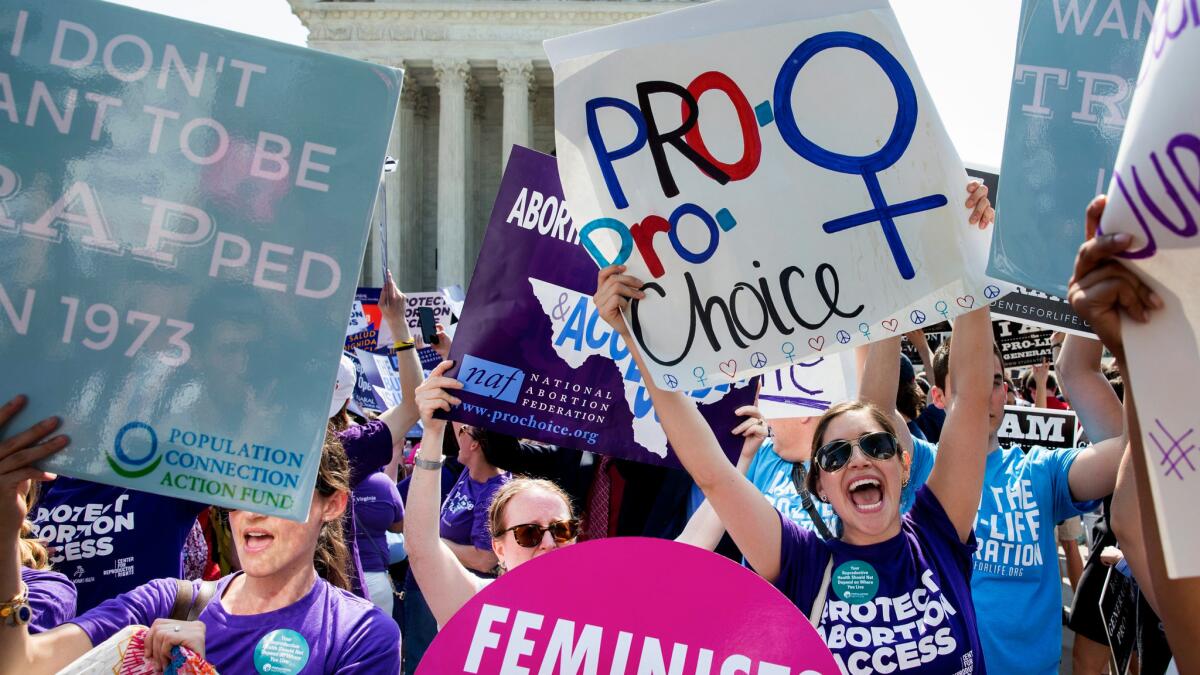Without action from the Supreme Court, getting an abortion in Louisiana may become impossible

- Share via
Opponents of a woman’s right to an abortion are so relentless that nothing seems to stop them. Even a clear Supreme Court precedent doesn’t serve as a deterrent.
Four years ago, the court took on one of the favorite tropes of abortion opponents — that to ensure women’s safety, doctors providing abortions need to have admitting privileges at hospitals near the clinics where they work. In that 2016 decision, Whole Woman’s Health vs. Hellerstedt, the justices struck down a Texas law that required abortion providers to have admitting privileges, finding that it was an unnecessary obstacle (or “undue burden” in court parlance) to women seeking abortions and did not enhance the safety of an already very safe procedure. According to a comprehensive review of published studies, office-based abortion clinics reported a less than 0.5% risk of hospitalization followed a first-trimester abortion, the most common type. But because many abortion providers could not obtain such privileges, the requirement would have shut down clinics across the state.
Yet Louisiana passed a law identical to the unconstitutional Texas statute, prompting a lawsuit by several abortion providers. The Louisiana law, which required doctors to have admitting privileges at hospitals within 30 miles of the clinics where they provided abortions, was struck down by a federal district court judge, but then upheld by the Fifth Circuit Court of Appeals. On Wednesday, the Supreme Court heard arguments in the case, June Medical Services L.L.C. vs. Russo.
Nothing has changed, medically, since the Supreme Court decided the Texas case four years ago. Abortion remains one of the safest medical procedures — in Louisiana and the rest of the country. As attorney Julie Rikelman of the Center for Reproductive Rights argued for the medical center and doctors who filed the suit, not only is the complication rate for abortion low, “but when complications do occur, it’s almost always after the woman has left the clinic.” At that point, a woman would go to the hospital nearest her home. Also, 40% of abortions in Louisiana are medication-induced, so any complications from those will happen when the patient is at home, anyway.
What has changed since the Texas decision in 2016 is the make-up of the court, with a key swing vote — Justice Anthony Kennedy — departing. Abortion opponents hope the new majority will decide that the situation in Louisiana is somehow different from Texas and uphold the Louisiana law.
But it isn’t, and they should not. Louisiana has an extremely safe rate for abortion care. The district court judge who ruled against the law found that the Hope Medical Group for Women — a Shreveport clinic run by the company that brought the petition before the Supreme Court — sees over 3,000 patients a year, and in the past 23 years, only four patients were sent to a hospital with complications.
In fact, of the handful of doctors providing abortions at the time this case was filed, only two had admitting privileges — one of whom is expected to retire if the law goes into effect. The remaining doctors tried to get admitting privileges and could not. They were turned down mainly because they weren’t doctors who had a lot of patients to admit to hospitals — not because they were bad doctors.
Not only does the law do nothing for the safety of patients, it only ends up hindering their access to abortion. Both the American Medical Association and the American College of Obstetricians and Gynecologists have said there is no health reason for admitting privileges. If the law were to go into effect (it is currently stayed pending the decision of the Supreme Court), the district court found that Louisiana would probably be left with only one clinic and one abortion provider. That, in essence, would decimate abortion care in a state that already has the most abortion restrictions of any state: 89.
The law is unconstitutional anyway because the burdens it would place on abortion rights outweigh the (non-existent) medical benefits it would provide. Like so many laws passed in states hostile to abortion rights, it is simply intended to thwart access to abortion. The Supreme Court decided that in the Texas case in 2016. It should decide the exact same thing in this Louisiana case in 2020.
More to Read
A cure for the common opinion
Get thought-provoking perspectives with our weekly newsletter.
You may occasionally receive promotional content from the Los Angeles Times.









